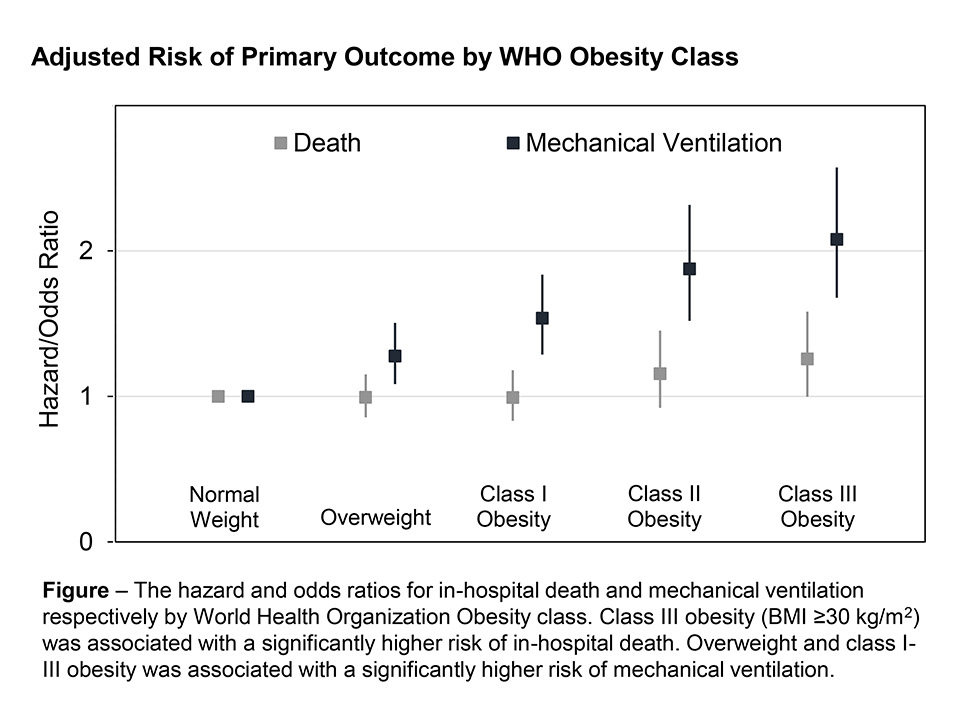Millions believe they’re safe from COVID-19 because of a magic elixir: youth. While it’s true that people under 50 are less likely to be hospitalized or die from coronavirus, a new UT Southwestern study has found a wrinkle in that belief: if you’re overweight, being younger doesn’t protect you from the dangers of COVID-19.
The link between obesity and bad COVID-19 outcomes is known. What’s new about this study? It said that linkage is actually stronger for younger people.
While all adults who are obese or overweight are at greater risk for serious COVID complications, the link is strongest if you’re age 50 or under, the study shows.
“If you’re young and obese, you’re still at high risk despite your age,” said Justin Grodin, M.D., the senior author of the study published today in Circulation, in a news release. (“Young” is defined as age 50 or younger in the study.)
Over 42 percent of American adults are obese, per the Centers for Disease Control and Prevention, and about 30 percent are overweight. “Overweight” is defined as a BMI (Body Mass Index) of 25-29, while people with a BMI of 30 or above are considered obese.

[Image: UTSW]
“In general, obese individuals are more likely to be hospitalized with COVID-19 than normal-weight individuals,” said Nicholas Hendren, M.D., a UTSW chief cardiology fellow and the first author of the study to be presented this week at the American Heart Association Scientific Sessions 2020 conference. “In the hospital, obese individuals are at higher risk for death or the need for mechanical ventilation to help them breathe, even if they are young.”
The more people weigh, the worse their COVID-19 outcomes are likely to get—which may impact who’s first in line for forthcoming vaccines, the study shows.
According to Grodin, who is an assistant professor of internal medicine at UT Southwestern, the findings should alert people who are overweight or obese—including those under 50 who think their youth protects them—that they are at greater risk from COVID-19. People with the most severe obesity, called Class III and defined as having a BMI of 40 or higher, “should be considered high risk and may warrant prioritization for a COVID-19 vaccine when it becomes available,” Grodin added. About 7 percent of adults fall into this category, the study said.
So why does obesity worsen outcomes for COVID-19 patients? The study suggests several possibilities.
First, obesity is associated with diseases that have been linked to worse COVID-19 outcomes, including hypertension and diabetes. Secondly, the SARS-CoV-2 virus uses an enzyme called ACE2 to enter and infect human cells—and ACE2 is abundant in fat tissue. Also, having more weight on the chest can make it harder for these patients to breathe, Grodin said.
Older COVID-19 patients have so many other risk factors that negative effects tied to obesity may be more apparent in younger patients, he added.
The Circulation study analyzed data from more than 7,600 patients at 88 U.S. hospitals who were enrolled in the American Heart Association’s COVID-19 Cardiovascular Disease Registry, according to the news release. James de Lemos, M.D., a UTSW professor of internal medicine, helped create the registry along with volunteers and AHA staff.
Looking at patients under 50 who were hospitalized for COVID-19, the study found the vast majority—85 percent—were either overweight or obese. Only 54 percent of patients over age 70 met these criteria, making weight more of a risk marker for the younger group, according to the study. For patients 50 and younger, people with severe obesity showed a 36 percent greater risk of dying, compared with normal-weight individuals. Overall, adult patients with severe obesity had a risk of dying 26 percent higher.
Among all adult patients, “the risk of being sick enough to require a ventilator rose in lock-step as weight increased from overweight to Class III obesity,” according to the release. The risk of death also rose for those with Class III obesity.
“There is a greater proportion of obese people among those hospitalized for COVID-19,” said Grodin, “and obese patients are at higher risk for complications.”
Higher BMI was also linked to the need for kidney dialysis and the development of blood clots in deep veins and the lungs, the study showed.
More studies are currently looking at how various patient attributes affect COVID-19 risk, using the AHA’s COVID Registry, Grodin said.
Other UTSW researchers who participated in the study were de Lemos, Colby Ayers, Sandeep R. Das, Anjali Rao, Spencer Carter, Anna Rosenblatt, Anita A. Hegde, and Mark H. Drazner. Collaborators included Jason Walchok of the American Heart Association, Wally Omar of Beth Israel Deaconess Medical Center, Rohan Khera of Yale School of Medicine and Yale-New Haven Hospital, and Ian J. Neeland of University Hospitals Harrington Heart and Vascular Institute and Case Western Reserve University School of Medicine.
![]()
Get on the list.
Dallas Innovates, every day.
Sign up to keep your eye on what’s new and next in Dallas-Fort Worth, every day.































